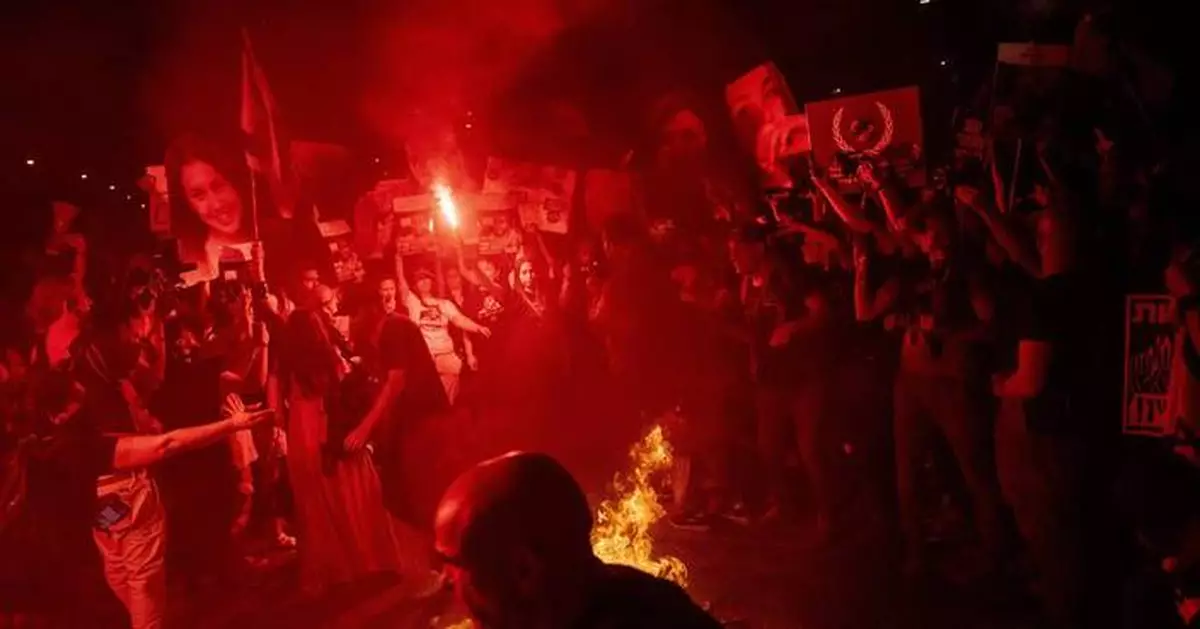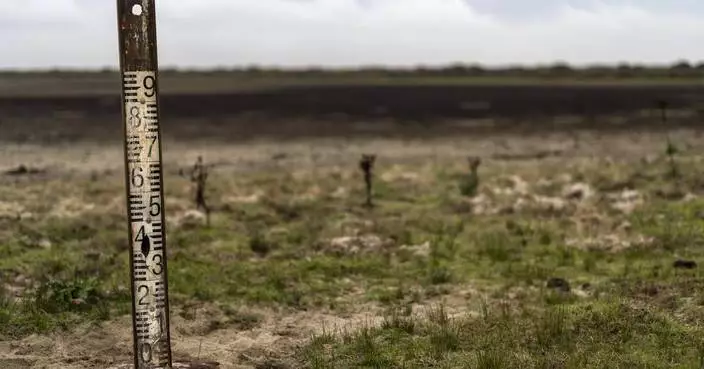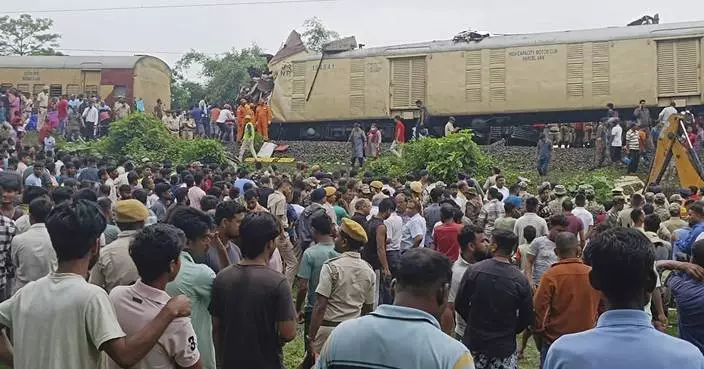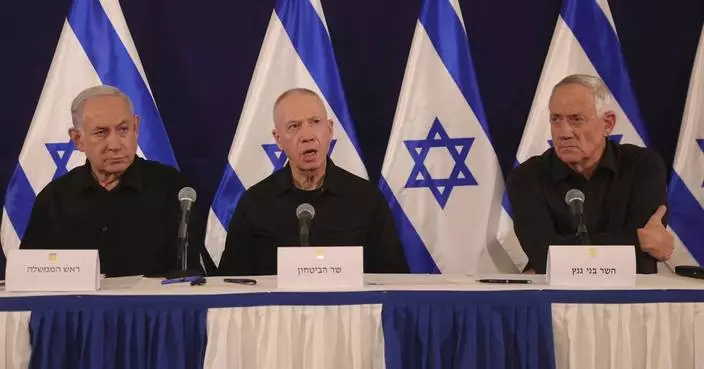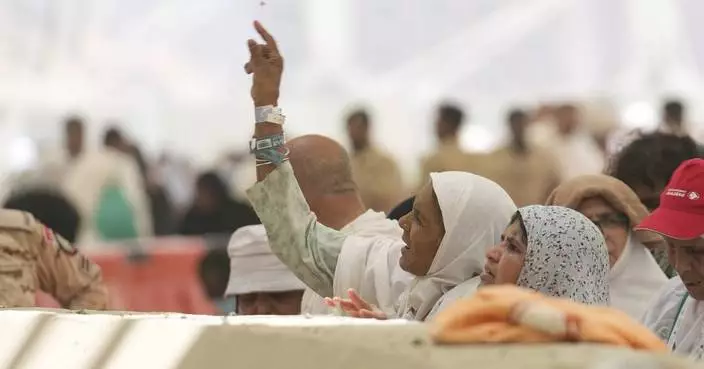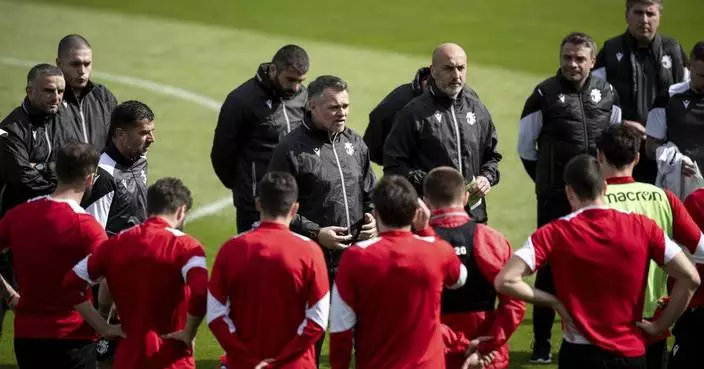JERUSALEM (AP) — Scuffles between Israeli police and protesters erupted in Tel Aviv on Saturday after thousands gathered to demonstrate against the government and demand that it bring back the hostages being held by Hamas in Gaza.
Meanwhile, a small U.S. military vessel and what appeared to be a strip of docking area washed up on a beach near the southern Israeli city of Ashdod, not far from the U.S.-built pier on which the Israeli military said humanitarian aid is moving into the Palestinian territory.
Also on Saturday, Israeli bombardments were reported in northern and central Gaza.
Some protesters in Tel Aviv carried photos of the female soldiers who appeared in a video earlier in the week showing them soon after they were abducted during the Hamas attack on Israel on Oct. 7 started the war between Israel and Hamas. Some held banners reading “Stop the war” and “Help.” They called on the government to reach a deal to release the dozens of hostages still in captivity.
The protesters also called for the resignation of Israeli Prime Minister Benjamin Netanyahu and demanded new elections.
“We all saw the video, we could not stay at home after the government abandoned all these people,” said Hilit Sagi, from the group “Women Protest for the Return of All Hostages.”
Divisions among Israelis have deepened over how Netanyahu has handled the war against Hamas after the attack that killed about 1,200 people and saw 250 others taken hostage. Israel says around 100 hostages are still being held in Gaza, along with the bodies of around 30 more.
“Basically they are not doing enough in order for the hostages to come back, either with military force, with (a) hostages’ deal, negotiating. Nothing is being done,” said Snir Dahan, uncle of hostage Carmel Gat, still in captivity in Gaza.
Earlier in the week, the bodies of three hostages killed were recovered from Gaza, Israel’s army said Friday. The army said they were killed on the day of the attack and their bodies were taken to Gaza. The announcement came less than a week after the army said it found the bodies of three other Israeli hostages killed on Oct. 7.
Around half of the 250 hostages taken by Hamas and other militants have been freed, most in swaps for Palestinian prisoners held by Israel during a weeklong cease-fire in November.
Netanyahu’s government has faced increasing pressure, both at home and abroad, to stop the war and allow humanitarian aid into the enclave that is home to 2.3 million Palestinians, almost 80% of whom have been displaced.
Also this week, three European countries announced they would recognize a Palestinian state, and the chief prosecutor for the International Criminal Court requested arrest warrants for Israeli leaders, along with Hamas officials.
On Friday the International Court of Justice ordered Israel to end its military offensive in the southern Gaza city of Rafah and to open the nearby border crossing for crucial humanitarian aid. The top United Nations court also said Israel must give war crimes investigators access to Gaza.
However, the judges stopped short of ordering a full cease-fire across the entire Palestinian territory, and Israel is unlikely to comply with the court’s ruling. South Africa accuses Israel of committing genocide against the Palestinians during the war in Gaza, which Israel vehemently denies.
“We were hoping the war would end,” said Islam Abu Kamar, who moved from Gaza City to Rafah following the ground operation launched by Israel after the Hamas attack in October.
In the past two weeks, more than a million Palestinians have fled Rafah as Israeli forces pressed deeper into the city. Israel’s takeover this month of the Rafah border crossing, a key transit point for fuel and supplies for Gaza, has contributed to bringing aid operations to near collapse, the U.N. and relief groups say.
Israel says it needs to invade Rafah to destroy Hamas’ last stronghold. Egypt said it agreed to send U.N. humanitarian aid trucks through the Kerem Shalom border crossing, Israel’s main entry point into southern Gaza. But it remains unclear if the trucks will be able to enter because fighting still rages in Rafah.
Israel said aid is moving into the Palestinian territory through northern Gaza and via the U.S.-built pier. On Saturday, a small U.S. military boat and what appeared to be a strip of docking area washed up on a beach near the southern Israeli city of Ashdod.
The U.S. Central Command said four of its vessels supporting the humanitarian aid mission were affected by rough seas with two of them anchoring near the pier off the Gaza coast and another two in Israel.
U.S. officials said no injuries were reported and the U.S. is working with the Israeli army to recover the vessels, Central Command said.
American officials hope the pier at maximum capacity can bring the equivalent of 150 truckloads of aid to Gaza daily. That’s a fraction of the 600 truckloads of food, emergency nutritional treatments and other supplies that USAID says are needed each day to bring people in Gaza back from the brink of famine and address the humanitarian crisis brought on by the 7-month-old Israel-Hamas war.
Israeli bombardments continued in the enclave on Saturday with reports of strikes northern and central Gaza. Witnesses said people were killed in strikes on the cities of Jabaliya and Nuseirat.
More than 35,000 Palestinians have been killed in the war, according to the Health Ministry, which doesn’t distinguish between combatants and civilians.
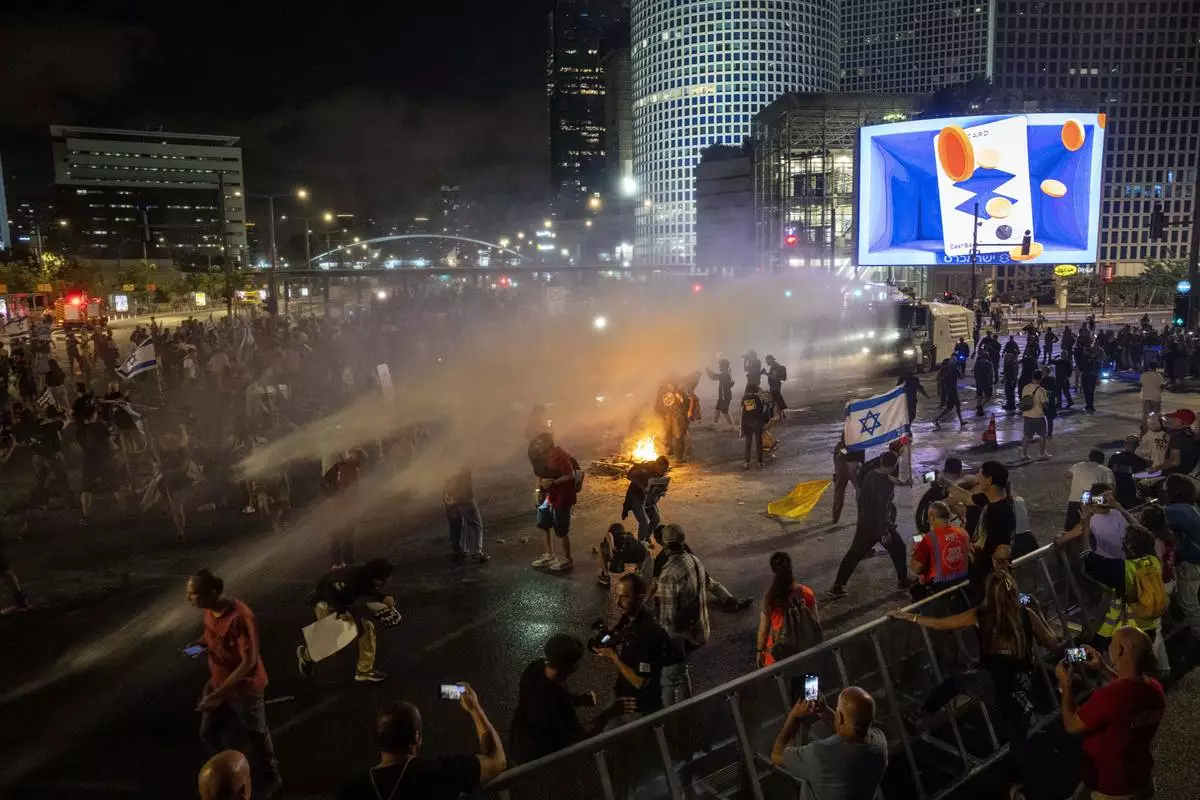
Police use water cannon to disperse demonstrators during a protest against Israeli Prime Minister Benjamin Netanyahu's government, and calling for the release of hostages held in the Gaza Strip by the Hamas militant group, in Tel Aviv, Israel, Saturday, May 25, 2024. (AP Photo/Ariel Schalit)
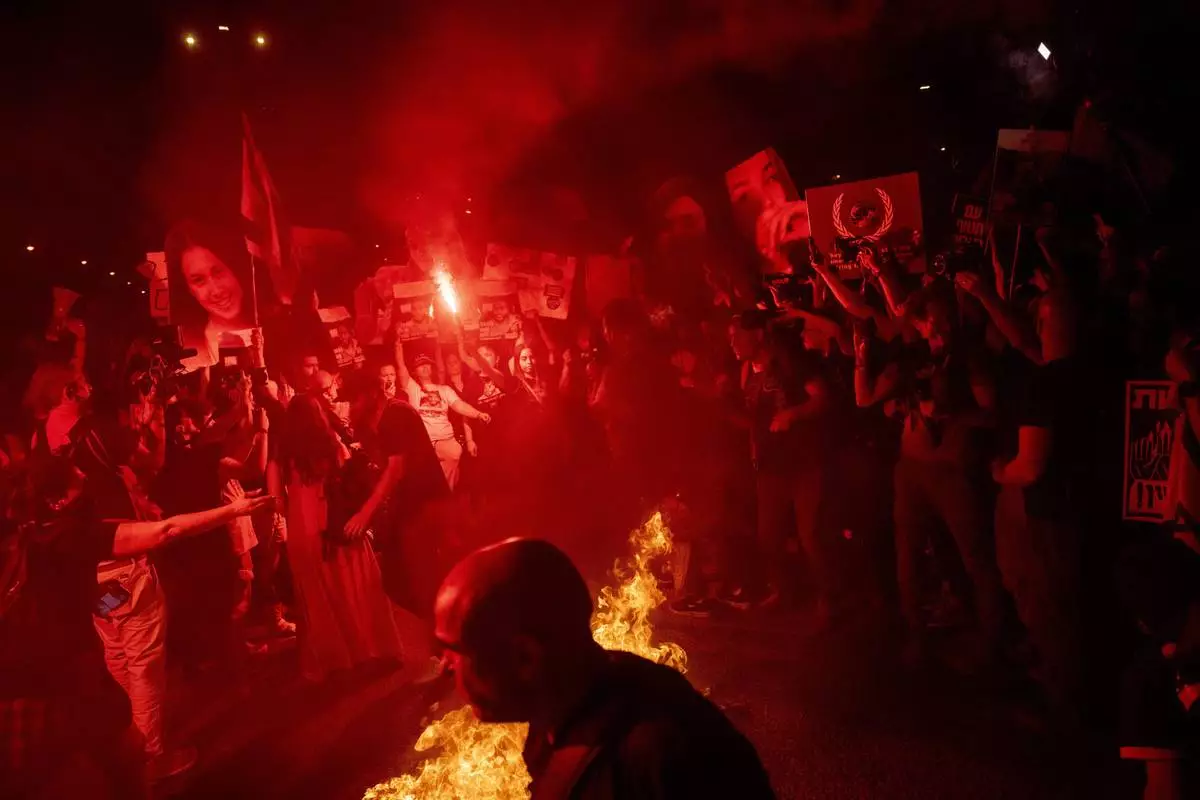
Demonstrators burn fire during a protest against Israeli Prime Minister Benjamin Netanyahu's government, and calling for the release of hostages held in the Gaza Strip by the Hamas militant group, in Tel Aviv, Israel, Sunday, May 26, 2024. (AP Photo/Ariel Schalit)
Israeli officials say Prime Minister Benjamin Netanyahu has dissolved the influential War Cabinet that was tasked with steering the war in Gaza.
The War Cabinet was dissolved following the departure from the government of Benny Gantz, an opposition lawmaker who had joined the coalition in the early days of the war. He had demanded that a small Cabinet be formed as a way to sideline far-right lawmakers in Netanyahu’s government. Gantz, Netanyahu and Defense Minister Yoav Gallant were its members and they made key decisions together throughout the war.
The officials, who spoke on condition of anonymity because they were not authorized to discuss the change with the media, said Monday that going forward Netanyahu would hold smaller forums with some of his government members for sensitive issues.
Gantz, a longtime political rival of Netanyahu’s, joined the government as a show of unity after Hamas’ Oct. 7 attack on southern Israel. He left the government earlier this month, citing frustration with Netanyahu’s handling of the war.
Critics say Netanyahu’s wartime decision-making has been influenced by ultranationalists in his government who oppose a deal that would bring about a cease-fire in exchange for the release of hostages. They have voiced support for the “voluntary migration” of Palestinians from the Gaza Strip and reoccupying the territory.
Netanyahu denies the accusations and says he has the country’s best interests in mind.
Israel’s war against Hamas in Gaza has killed more than 37,100 people, according to Gaza’s Health Ministry, which does not distinguish between combatants and civilians in its count.
Israel launched the war after Hamas’ Oct. 7 attack, in which militants stormed into southern Israel, killed some 1,200 people — mostly civilians — and abducted about 250.
Currently:
— The war in Gaza is wiping out entire Palestinian families, one branch at a time. This is how
— The war in Gaza has wiped out entire Palestinian families. AP documents 60 who lost dozens or more
— Israel’s army says it will pause daytime fighting along a route in southern Gaza to help flow of aid
— 8 Israeli soldiers killed in southern Gaza in deadliest attack on Israeli forces in months
— US aircraft carrier counters false Houthi claims with ‘Taco Tuesdays’ as deployment stretches on
Follow AP’s coverage of the war in Gaza at https://apnews.com/hub/israel-hamas-war
Here's the latest:
TEL AVIV, Israel — Israeli officials say Prime Minister Benjamin Netanyahu has dissolved the influential War Cabinet that was tasked with steering the war in Gaza.
The War Cabinet was dissolved following the departure from the government of Benny Gantz, an opposition lawmaker who had joined the coalition in the early days of the war. He had demanded that a small Cabinet be formed as a way to sideline far-right lawmakers in Netanyahu’s government. Gantz, Netanyahu and Defense Minister Yoav Gallant were its members and they made key decisions together throughout the war.
The officials, who spoke on condition of anonymity because they were not authorized to discuss the change with the media, said Monday that going forward, Netanyahu would hold smaller forums with some of his government members for sensitive issues.
Gantz, a longtime political rival of Netanyahu’s, joined the government as a show of unity after Hamas’ Oct. 7 attack on southern Israel. He left the government earlier this month, citing frustration with Netanyahu’s handling of the war.
Critics say Netanyahu’s wartime decision-making has been influenced by ultranationalists in his government who oppose a deal that would bring about a cease-fire in exchange for the release of hostages. They have voiced support for “voluntary migration” of Palestinians from the Gaza Strip and reoccupying the territory.
Netanyahu denies the accusations and says he has the country’s best interests in mind.
Associated Press writer Tia Goldenberg contributed to this report from Tel Aviv, Israel.
VILLEPINTE, France — A major defense and security industry show outside Paris says a French court has banned Israeli exhibitors from participating.
Event organizers said in a press release posted at the entrance of the Eurosatory exhibition, seen Monday by Associated Press journalists, that the court order issued Friday prohibited “the participation of employees or representatives, of any nationality whatsoever, of Israeli companies” in the show.
“In addition, all exhibiting companies are prohibited from receiving, selling or promoting Israeli weapons,” the press release said. It also said exhibitors cannot act as intermediaries at the show for Israeli companies “in any way whatsoever.”
It did not say what motivated the court’s decision. But it said the ruling came on the heels of a French government decision two weeks ago to prohibit Israeli companies from exhibiting at the show “in the current context.”
The event organizers said they’ll appeal the court decision “as soon as possible.” The Eurosatory exhibition, held every two years at Villepinte northeast of Paris, opened Monday and runs to Friday.
JERUSALEM — Israel’s military announced on Sunday that it would pause fighting during daytime hours along a route in southern Gaza to free up a backlog of humanitarian aid deliveries for desperate Palestinians enduring a humanitarian crisis sparked by the war, now in its ninth month.
The “tactical pause,” which applies to about 12 kilometers (7½ miles) of road in the Rafah area, falls far short of a complete cease-fire in the territory that has been sought by the international community, including Israel’s top ally, the United States. It could help address the overwhelming needs of Palestinians that have surged in recent weeks with Israel’s incursion into Rafah.
The army said that the daily pause would begin at 8 a.m. and last until 7 p.m. and continue until further notice. It’s aimed at allowing aid trucks to reach the nearby Israel-controlled Kerem Shalom crossing, the main entry point, and travel safely to the Salah a-Din highway, a main north-south road, the military said. The crossing has had a bottleneck since Israeli ground troops moved into Rafah in early May.
COGAT, the Israeli military body that oversees aid distribution in Gaza, said the route would increase the flow of aid to other parts of Gaza, including Khan Younis, the coastal area of Muwasi and central Gaza. Hard-hit northern Gaza, an early target in the war, is served by goods entering from the north.
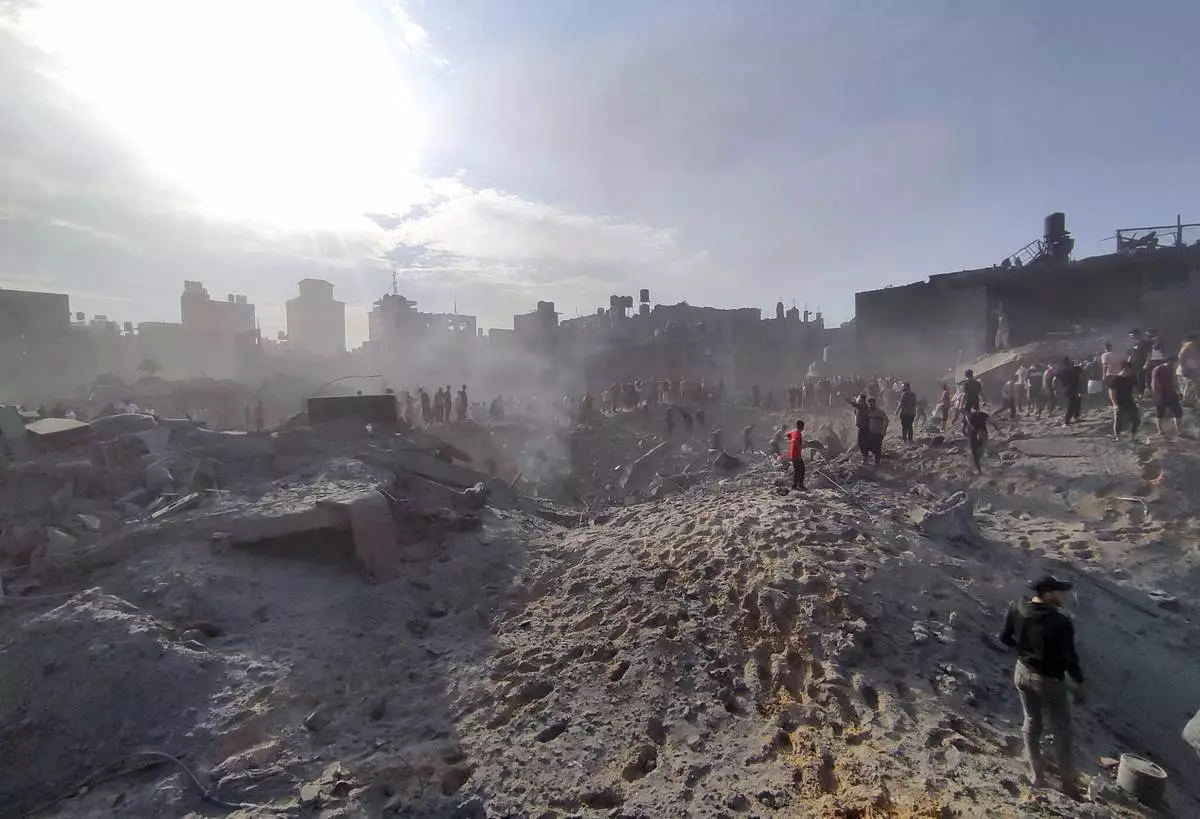
FILE - Palestinians inspect the damage of buildings destroyed by Israeli airstrikes on Jabaliya refugee camp on the outskirts of Gaza City on Oct. 31, 2023. Jabaliya refugee camp was one of Gaza’s most densely populated areas and has been struck multiple times since Oct. 7. The true toll remains unknown because many remain under the rubble. (AP Photo/Abdul Qader Sabbah, File)
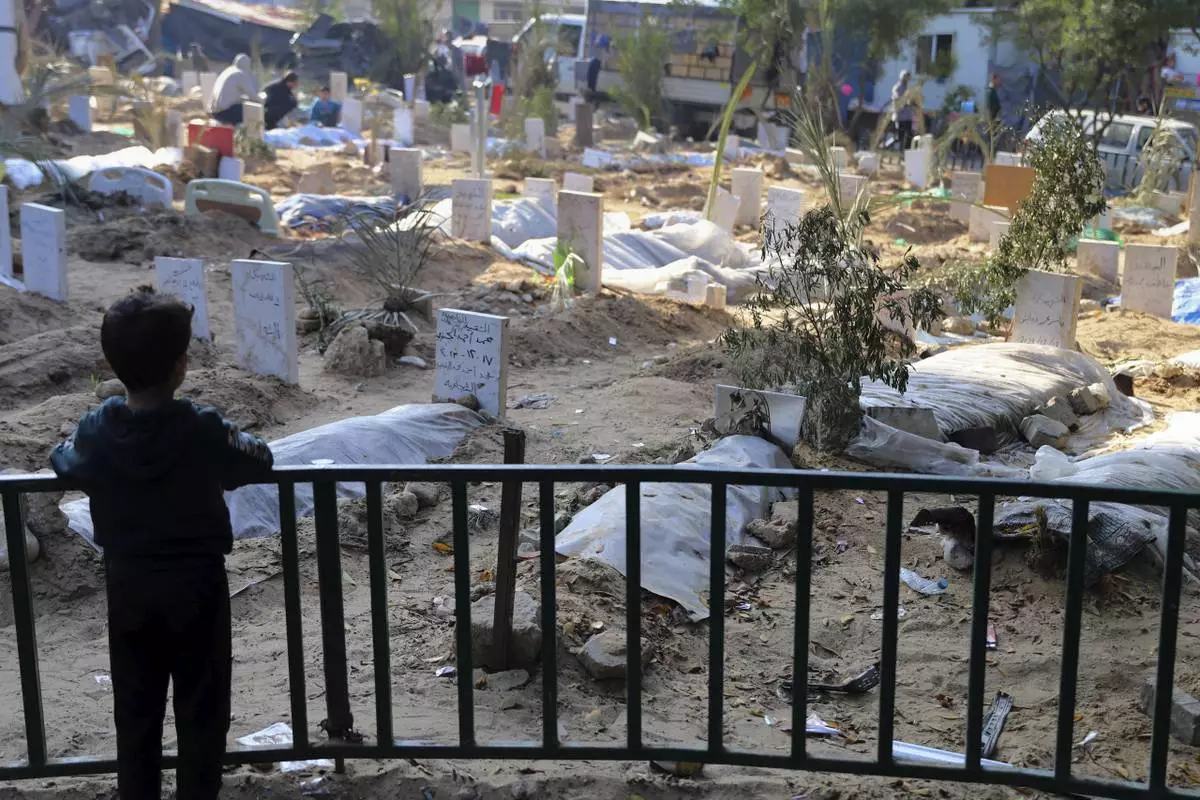
FILE - A Palestinian child looks at the graves of people killed in the Israeli bombardment of the Gaza Strip and buried inside the Shifa Hospital grounds in Gaza City, Sunday, Dec. 31, 2023. (AP Photo/Mohammed Hajjar, File)
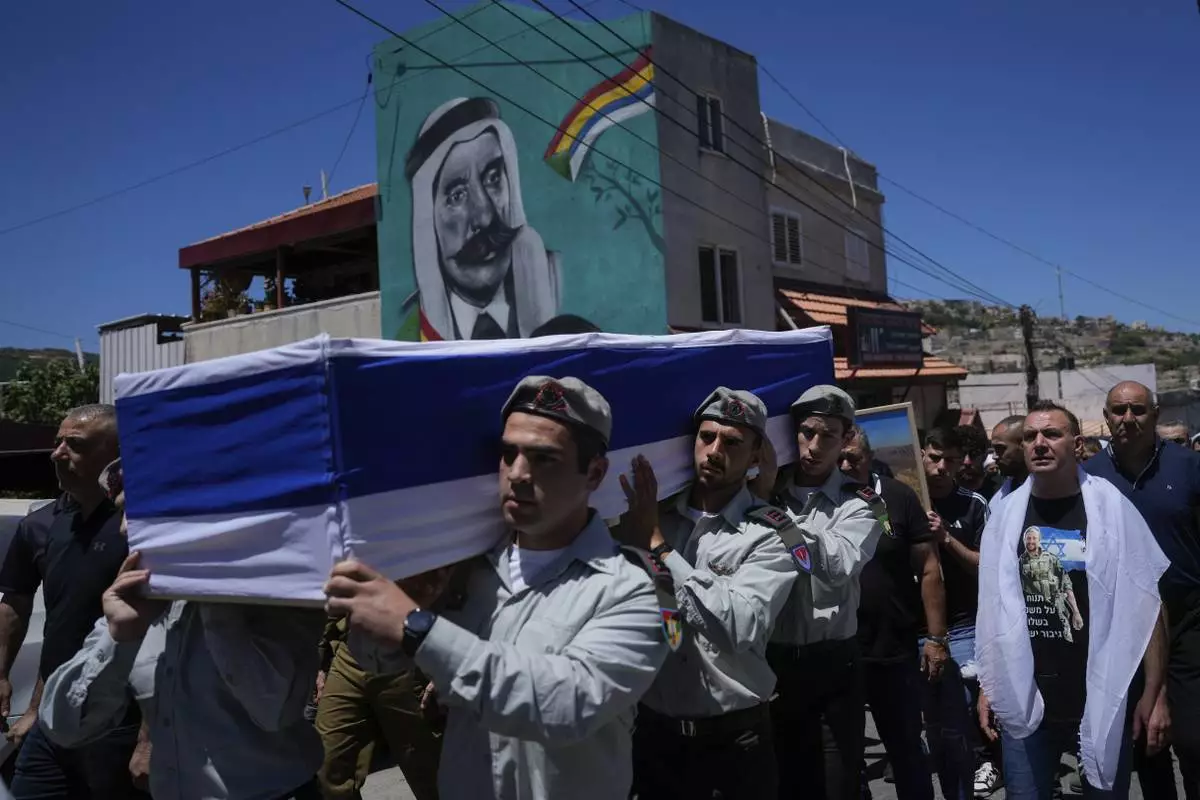
Israeli soldiers carry the flag-draped casket of Capt. Wassem Mahmoud during his funeral in the village of Beit Jann, northern Israel, Sunday, June 16, 2024. Mahmoud, 23, a member of the Druze minority, was killed during Israel's ground operation in the Gaza Strip, where the Israeli army has been battling Palestinian militants in the war ignited by Hamas' Oct. 7 attack on Israel. (AP Photo/Ohad Zwigenberg)
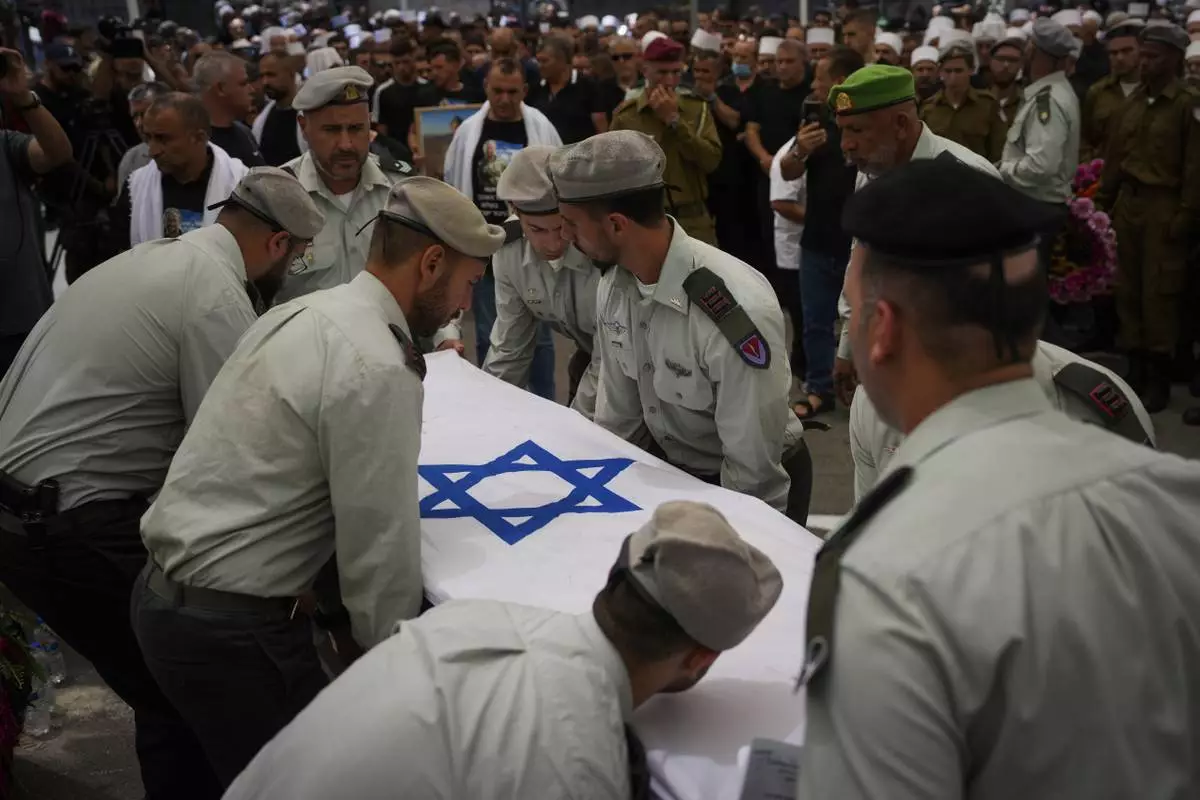
Israeli soldiers carry the flag-draped casket of Capt. Wassem Mahmoud during his funeral in the village of Beit Jann, northern Israel, Sunday, June 16, 2024. Mahmoud, 23, a member of the Druze minority, was killed during Israel's ground operation in the Gaza Strip, where the Israeli army has been battling Palestinian militants in the war ignited by Hamas' Oct. 7 attack on Israel. (AP Photo/Ohad Zwigenberg)
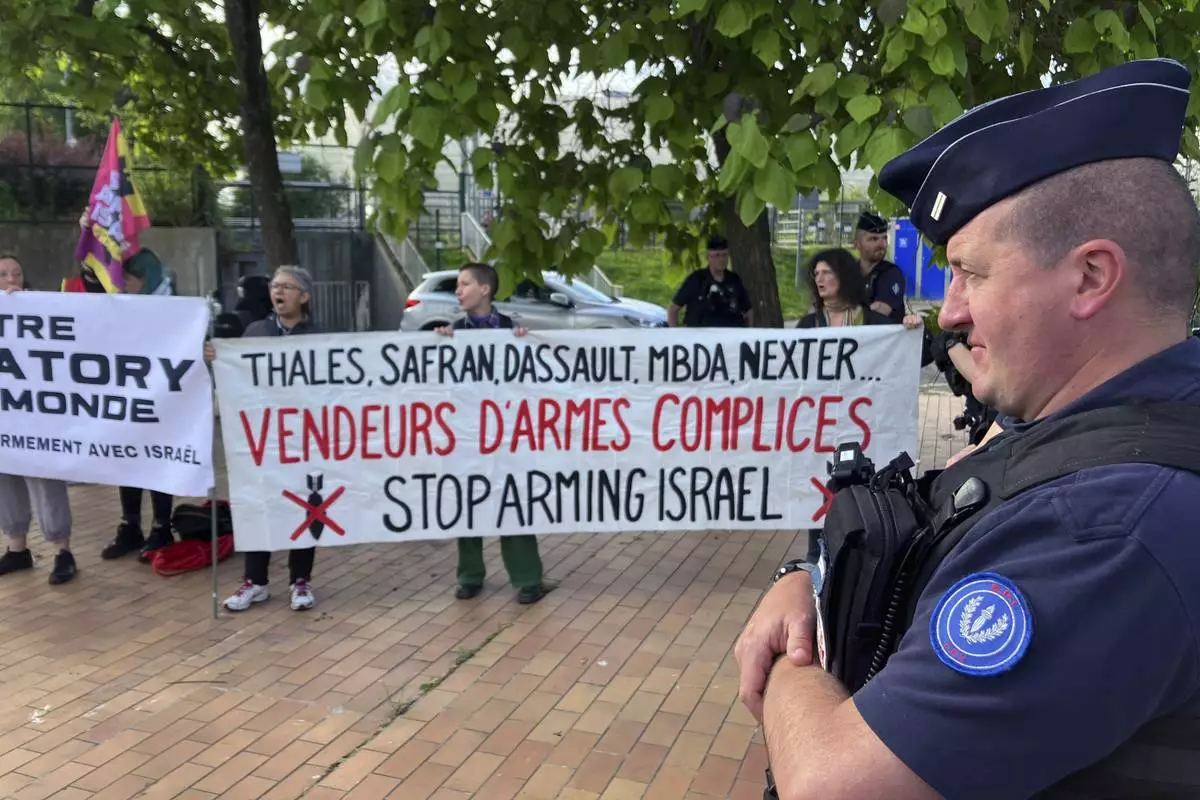
Protestors gather outside the Eurosatory exhibition, a global event for Defence and Security, in Villepinte, outside Paris, Monday, June 17, 2024. A major defense and security industry show outside Paris says a French court has banned Israeli exhibitors from participating. Banner reads, 'Arms dealers accomplices'. (AP Photo/Masha Macpherson)
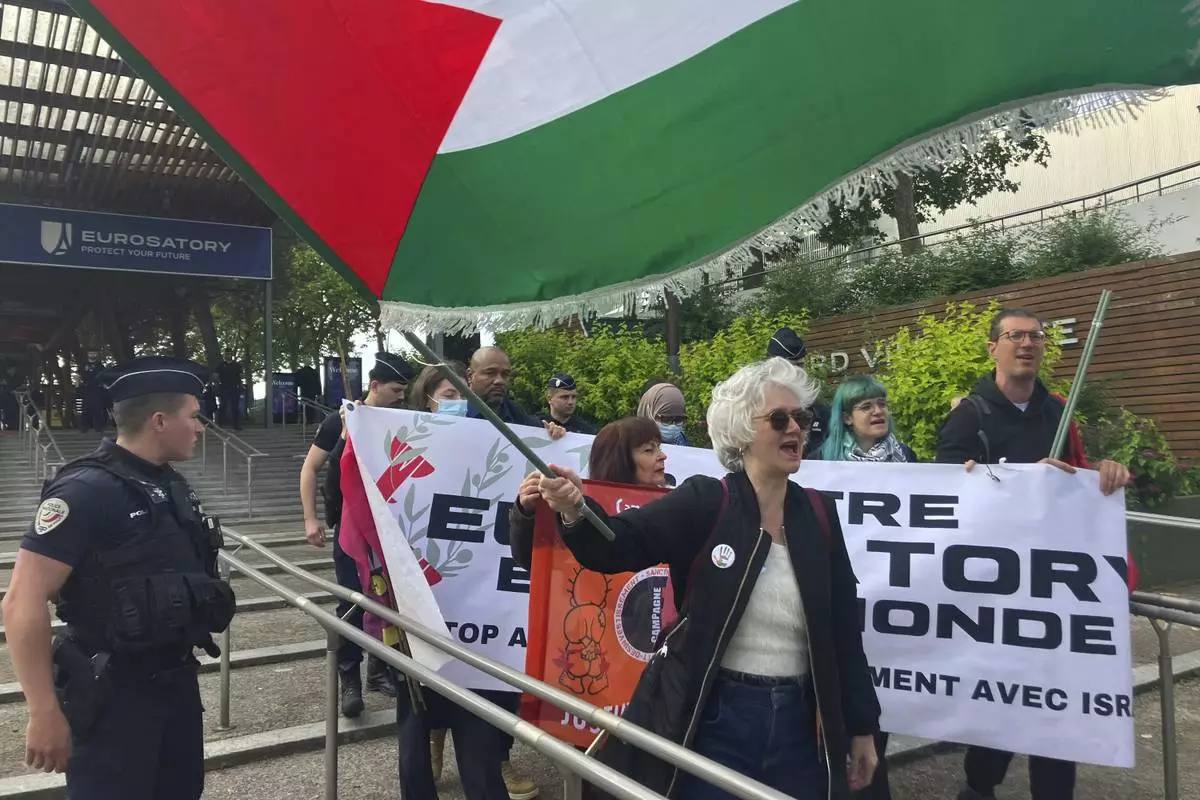
Protestors gather outside the Eurosatory exhibition, a global event for Defence and Security, in Villepinte, outside Paris, Monday, June 17, 2024. A major defense and security industry show outside Paris says a French court has banned Israeli exhibitors from participating. (AP Photo/Masha Macpherson)
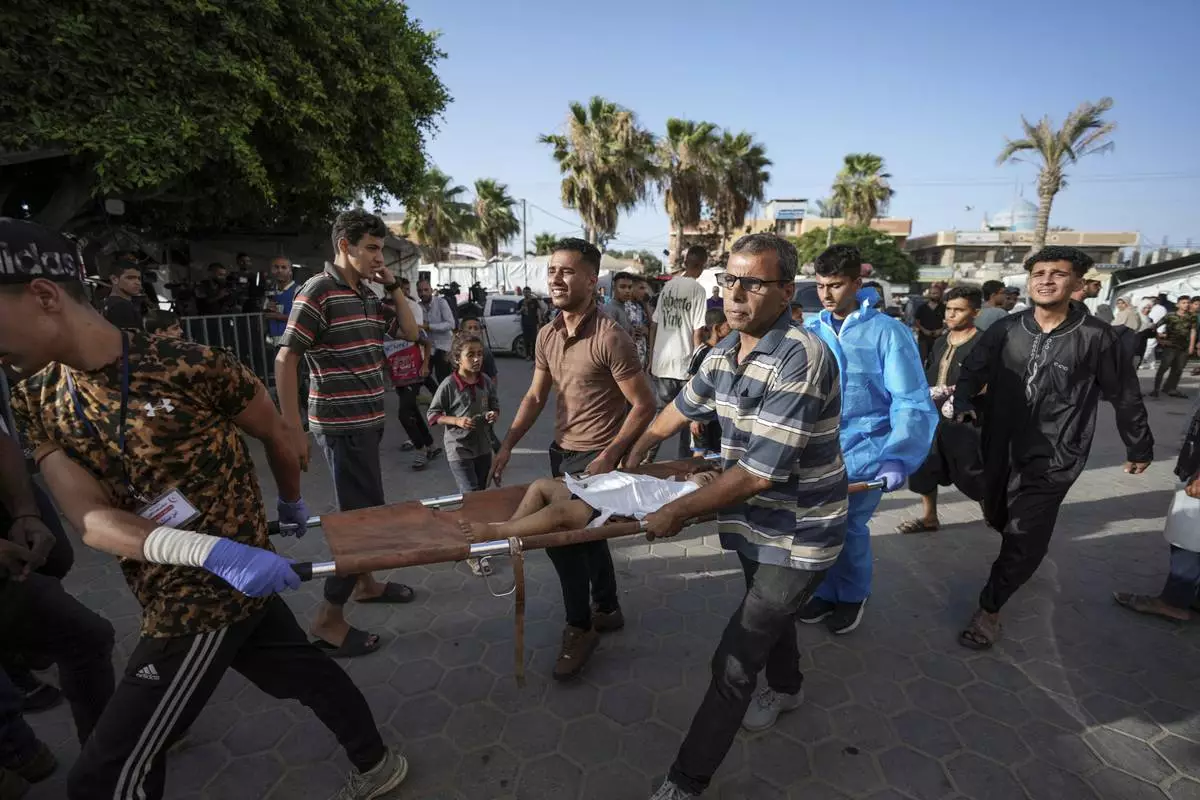
Palestinians carry a child killed in the Israeli bombardment of the Gaza Strip into a hospital in Deir al Balah on Sunday, June 16, 2024. (AP Photo/Abdel Kareem Hana)
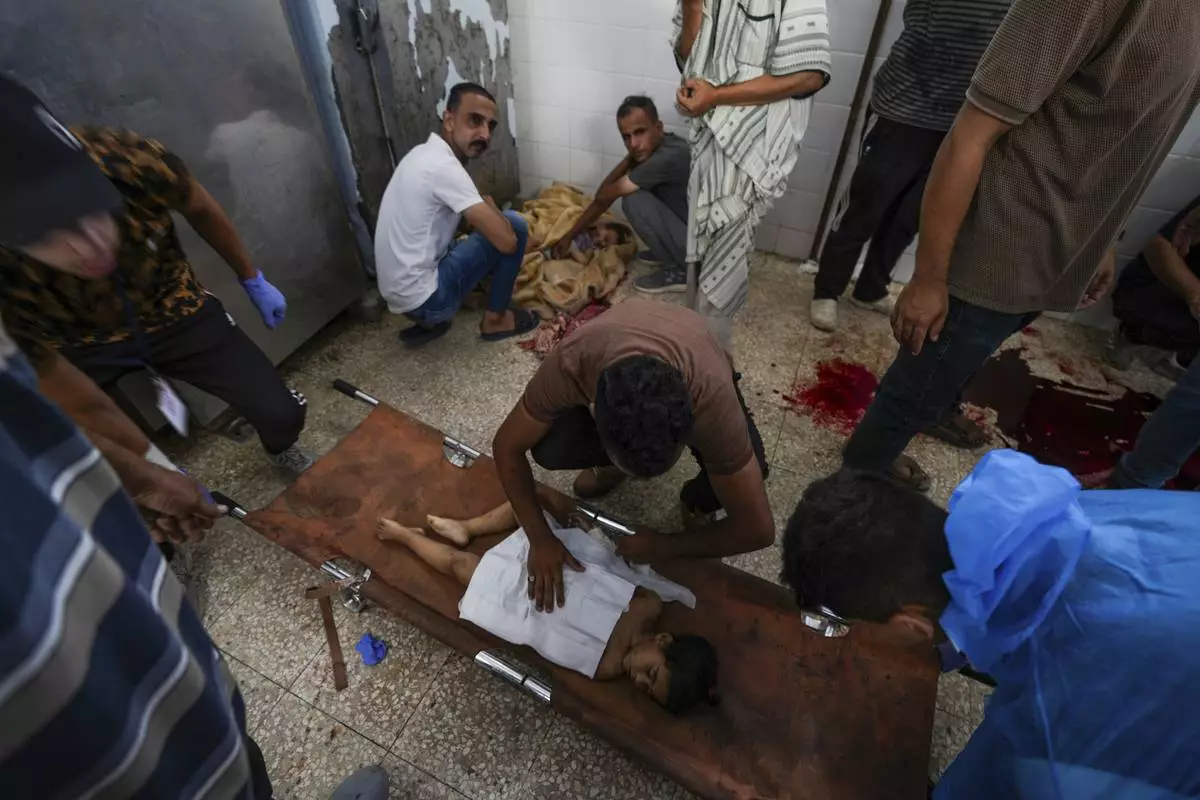
Palestinians mourn their relatives killed in the Israeli bombardment of the Gaza Strip in a hospital in Deir al Balah on Sunday, June 16, 2024. (AP Photo/Abdel Kareem Hana)




